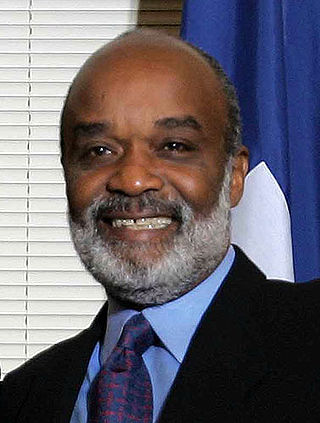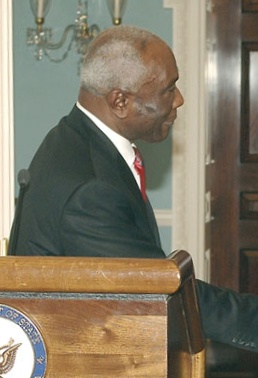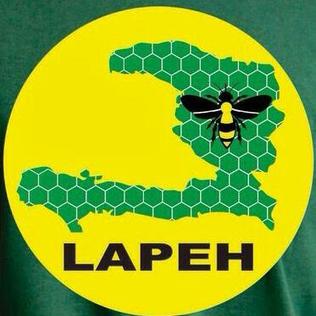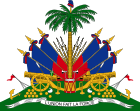
Jean-Bertrand Aristide is a Haitian former Salesian priest and politician who became Haiti's first democratically elected president. As a priest, he taught liberation theology and, as a president, he attempted to normalize Afro-Creole culture, including Vodou religion, in Haiti. Aristide was appointed to a parish in Port-au-Prince in 1982 after completing his studies to become a priest. He became a focal point for the pro-democracy movement first under Jean-Claude "Baby Doc" Duvalier and then under the military transition regime which followed. He won the 1990–91 Haitian general election, with 67% of the vote.

Fanmi Lavalas, is a social-democratic political party in Haiti. Its leader is former Haitian President Jean-Bertrand Aristide. It has been a powerful force in Haitian politics since 1991. Fanmi Lavalas governments advocate a policy of "growth with equity" based on Western European social democratic principles. Fanmi Lavalas governments have emphasised investment in education and health care as their priorities and have refused International Monetary Fund austerity measures.

This article includes current and historical political parties in Haiti. Haiti is a country on the western side of Hispaniola, an island in the Caribbean. Few political parties have a strong organizational base or command a national following.

René Garcia Préval was a Haitian politician and agronomist who twice was President of Haiti, from early 1996 to early 2001, and again from mid-2006 to mid-2011. He was also Prime Minister from early to late 1991 under the presidency of Jean-Bertrand Aristide.
Gérard Jean-Juste was a Haitian Roman Catholic priest and rector of Saint Claire's church for the poor in Port-au-Prince, Haiti. He was also a liberation theologian and a supporter of the Fanmi Lavalas political party, as well as heading the Miami, Florida-based Haitian Refugee Center from 1977 to 1990.

General elections were held in Haiti in 1995. The presidential election, held on 17 December, resulted in a victory for René Préval of Fanmi Lavalas. The parliamentary elections, held on 25 June, 13 August and 17 September, were also won by Lavalas. Voter turnout was just 31.09% for the parliamentary elections and 27.8% for the presidential elections.

General elections were held in Haiti on 7 February 2006 to elect the replacements for the interim government of Gérard Latortue, which had been put in place after the 2004 Haiti rebellion. The elections were delayed four times, having originally been scheduled for October and November 2005. Voters elected a president, all 99 seats in the Chamber of Deputies of Haiti and all 30 seats in the Senate of Haiti. Voter turnout was around 60%. Run-off elections for the Chamber of Deputies of Haiti were held on 21 April, with around 28% turnout.

Jacques-Édouard Alexis is a Haitian politician. He served as the Prime Minister of Haiti from 1999 to 2001 and was Prime Minister for a second term from 2006 to 2008 when he was dismissed due to political fallout from food riots.

Parliamentary elections were held in Haiti on May 21 and July 9, 2000, electing all 82 seats in the Chamber of Deputies and nineteen seats in the Senate. A further eight seats in the Senate were elected on November 26, alongside the presidential elections. The first round of legislative elections generated so much conflict that the fall elections were boycotted by the opposition.
Fwon Lespwa was a Haitian political coalition headed by René Préval, who served as president from 1996 to 2001 and from 2006 to 2011. The name Lespwa is the Haitian Creole form of the French l'espoir, meaning "hope". The coalition's full French name is Front de l'Espoir. Lespwa included many members and former members of the last government of Jean-Bertrand Aristide and his Fanmi Lavalas.

The Struggling People's Organization, called until 1996 Lavalas Political Organization, is a Haitian political party originating from the Lavalas political movement. Formed in 1995, the pro-Aristide Lavalas faction split from the party in 1996 forming their own Fanmi Lavalas party, at this time the OPL's name was changed from Organisation Politique Lavalas to its present appellation. This split meant that few of the intelligentsia that had previously supported Jean-Bertrand Aristide ended up in the new Lavalas.

The National Assembly consisted of the bicameral legislature of the Republic of Haiti, consisting of the upper house as the Senate and the lower house as the Chamber of Deputies .[A88] Both assemblies conduct legislative sessions at the Haitian capital of Port-au-Prince.[A103]
The Coalition of Progressive Parliamentarians is a political alliance in the National Assembly of Haiti, primarily in the lower house. It currently consists of 53 out of 99 sitting deputies, and is the largest bloc in the legislature.

Parliamentary elections were held in Haiti on 6 April 1997 for one-third of the seats in the Senate and two seats in the Chamber of Deputies. A total of 45 candidates from 15 parties contested the Senate elections.

Parliamentary elections were held in Haiti on 9 August 2015, with a second round initially planned for 25 October. Two-thirds of the Senate and all members of the Chamber of Deputies were up for election. International observers reported that early rounds of voting have experienced significant fraud, including people voting more than once due to failure of indelible ink, vote buying due to lack of secrecy, poor training of election workers, poor tracking of political parties, and other problems. This has resulted in the nullification of some results and rescheduling of re-runs. The second round of the parliamentary elections that had been scheduled for October 2015 was postponed to October 2016, along with the first round for a third of the Senate and the first round of a new presidential election.

Patriotic Unity, is a political party in Haiti founded on 28 November 2009. Its dissolution had been claimed by former leading members on 30 April 2019 but was then disputed by the current leadership. Its founder and leader was René Préval, who served as President of Haiti from 2006 to 2011.

Alternative League for Haitian Progress and Emancipation is a Haitian political party. The party is led by Jude Célestin, and held three seats in the Chamber of Deputies after the 2015 election, while holding no seats in the Senate, although both houses of Haitian parliament have been vacant since January 10, 2023. The party abbreviation, LAPEH, is pronounced like the Haitian Creole word "lapé", meaning "peace", from French "la paix".

Presidential elections were held in Haiti on 20 November 2016 after having been postponed several times. The elections were overseen by the Provisional Electoral Council (CEP), and were held using the two-round system, with a second round scheduled for 29 January 2017 if no candidate received an absolute majority of the votes in the first round. However, on 27 November election officials announced that, according to preliminary results, Jovenel Moïse had won the election in the first round with more than 50% of the vote. Voter turnout, in the election held 6 weeks after Hurricane Matthew hit Haiti, was reported to be 21%. Jovenel Moïse assumed office on 7 February 2017, and was assassinated on 7 July 2021.

Senate elections were held in Haiti with a first round on 20 November 2016, and a second on 29 January 2017. The first round were held simultaneously with the presidential elections and the second round of the parliamentary elections that still had a run-off pending in some constituencies since 2015.









